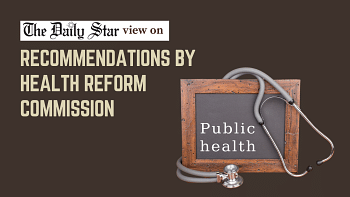Staff shortages in hospitals are worsening the healthcare crisis

As in many other sectors in Bangladesh, it often takes little time to undertake projects to build or expand infrastructure in the health sector, but properly staffing these facilities can take years, sometimes even a decade or so. The Barguna General Hospital, upgraded from a 100-bed to a 250-bed facility in 2013, has been suffering from this ailment—a chronic manpower shortage lasting 12 years.
According to a report, nearly half of the 233 sanctioned posts at the hospital—including doctors, consultants, nurses, medical officers, and mortuary staff—remain vacant. Most of the unfilled positions are among medical officers, doctors, and senior consultants. Alarmingly, there is only one senior consultant—an anaesthesiologist—despite there being 10 sanctioned posts. This means departments such as cardiology, orthopaedics, gynaecology, medicine, paediatrics, pathology, surgery, ENT, and ophthalmology have no senior consultants. Ironically, patients usually require a specialist's consultation for issues involving the heart, bones, reproductive health, and other critical areas before they ever need an anaesthesiologist.
There is also a dire shortage of medical officers (with 22 out of 29 positions vacant) and doctors (with 39 out of 55 vacant). Even basic medical consultation has become difficult to obtain, and patients are frequently referred to hospitals in Barishal or Dhaka. What, then, is the point of expanding a hospital if it cannot serve the local community? We have consistently emphasised the importance of decentralising healthcare to make it more accessible and affordable. But how can this be achieved in the absence of sufficient recruitments, or when medical professionals avoid serving in towns and rural areas? While it is true that such locations often lack the amenities found in major cities, these areas will never develop if essential public services, like healthcare, are not provided. The lack of access to proper, timely care often pushes patients towards private clinics, where they must pay exorbitant fees.
Bangladesh already has one of the lowest doctor-to-patient ratios in South Asia, and the uneven distribution of medical professionals worsens the situation for those living outside cities. The health sector also suffers from chronic underfunding and underutilisation of allocated resources. Against this backdrop, the need for a comprehensive overhaul of public healthcare cannot be stressed enough. Achieving this will require more than just government policy or political will; it demands the sincerity and commitment of medical professionals, too. Those who take the Hippocratic Oath must also rise to the occasion.


 For all latest news, follow The Daily Star's Google News channel.
For all latest news, follow The Daily Star's Google News channel. 





Comments